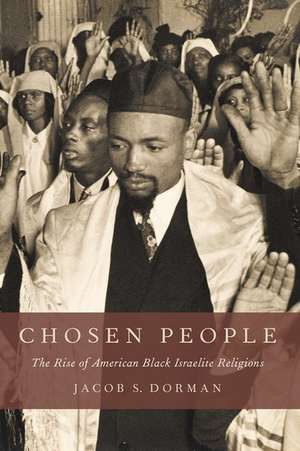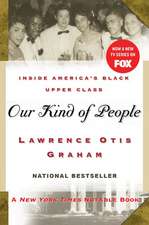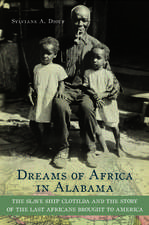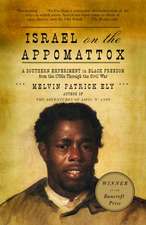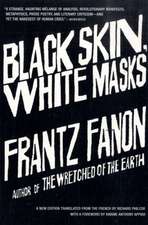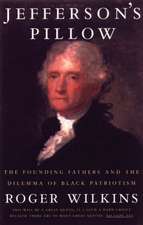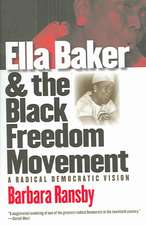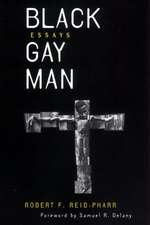Chosen People: The Rise of American Black Israelite Religions
Autor Jacob S. Dormanen Limba Engleză Paperback – 28 apr 2016
Preț: 244.01 lei
Nou
Puncte Express: 366
Preț estimativ în valută:
46.70€ • 47.82$ • 38.84£
46.70€ • 47.82$ • 38.84£
Carte tipărită la comandă
Livrare economică 07-13 martie
Preluare comenzi: 021 569.72.76
Specificații
ISBN-13: 9780190490096
ISBN-10: 0190490098
Pagini: 322
Ilustrații: 25 illus.
Dimensiuni: 155 x 231 x 23 mm
Greutate: 0.46 kg
Editura: Oxford University Press
Colecția OUP USA
Locul publicării:New York, United States
ISBN-10: 0190490098
Pagini: 322
Ilustrații: 25 illus.
Dimensiuni: 155 x 231 x 23 mm
Greutate: 0.46 kg
Editura: Oxford University Press
Colecția OUP USA
Locul publicării:New York, United States
Recenzii
[A] delightfully readable intellectual history of Black Israelite religion...It will be a fascinating read for anyone interested in African American religious history, especially that which lies beyond the mainstream, and it has much to offer scholars interested in the interplay of religion and culture in North America.
Chosen People is a bold, compelling history of Black 'Israelite' religions among African- descended people in places as far afield as Kansas, Harlem, and Ethiopia. Highlighting Jewish, Christian, and Muslim ideas and practices, the book explores the dynamic, historically specific 'bricolage' that made Black Israelite religions. It is a novel intervention in scholarly debates of cultural change in the African diaspora, a must- read for scholars of the African diaspora, religious studies, and cultural production.
Chosen People is unique in placing Black Israelite religions in the complex context of American history and is the most comprehensive work of scholarship on this topic...No one attempting to understand the rise of Black Israelite religions in America can afford to do without Chosen People.
Chosen People offers a fascinating look at Black Israelites, people who resided in the interstices of groups and ideas we commonly separate-Blacks and Jews, religion and politics, history and identity, cultural theory and historical documentation, Christians and Jews. Dorman situates his subjects in an incredibly rich context, illuminating not only those African Americans who believed in the blackness of the ancient Hebrews, but also the many social, political, and cultural forces operating in post-emancipation African American history. It is fascinating reading for anyone interested in American religion, history, or culture.
Jacob Dorman has written a masterful (even paradigm-shifting) book on Black Judaism, a genuine tour de force. Carefully combining a close reading of primary artifacts/evidence with substantive life-history interviews, critiques/re-readings of various secondary literatures, and even a healthy dash of what I'd call a decidedly ethnographic sensibility, Dorman has crafted a powerful and meticulous portrait of the nineteenth- and twentieth-century Black Jewish leaders who institutionalized versions of Black Judaic subjectivity in the United States that can still boast many adherents all around the country and the world today. Chosen People is an engaging and thoughtful read for students and scholars of Jewish studies, Africana studies, religious studies, and American history.
Jacob Dorman has not only established himself as the leading historian on Black Israelites, but has made an immense contribution to our understanding of the African Diaspora, religion and modernity, and the vexing problem of cultural identity. The research is prodigious, the scope impressive, and his telling of how African-descended people embraced and transformed Judaism is truly dynamic. Most importantly, Chosen People reminds us that people are not merely inheritors of tradition but its creators.
Jacob Dorman extends historical narratives of African American religion beyond 'Black Jews' to the kinship between Black Israelites, Ethiopians, Rastafarians, and Holiness-Pentecostal Christians, with Freemasons, Conjurers and Mystic Scientists forming a bricolage of ideational, rather than hereditary, traditions. This is a fascinating study that shifts models of African American cultural transmission and religious innovation from 'roots' to 'rhizomes,' and from 'syncretism' to 'polyculturalism.'
Dorman's book draws an intricate web of connections between Israelites, black Jews, Holiness, Pentecostal, and Anglo-Israelite groups, all with a skilled reading of the meaning of religious symbols.
Dorman provides an engaging study of the complex nature of the creation and evolution of Black Israelite religions on the Great Plains, in the great cities of all regions of the United States, and as a result of the great migrations that carried practitioners of these religions to other parts of the world. This significant book makes a valuable contribution to the literature on cultural synthesis and African American history.
Chosen People is a bold, compelling history of Black 'Israelite' religions among African- descended people in places as far afield as Kansas, Harlem, and Ethiopia. Highlighting Jewish, Christian, and Muslim ideas and practices, the book explores the dynamic, historically specific 'bricolage' that made Black Israelite religions. It is a novel intervention in scholarly debates of cultural change in the African diaspora, a must- read for scholars of the African diaspora, religious studies, and cultural production.
Chosen People is unique in placing Black Israelite religions in the complex context of American history and is the most comprehensive work of scholarship on this topic...No one attempting to understand the rise of Black Israelite religions in America can afford to do without Chosen People.
Chosen People offers a fascinating look at Black Israelites, people who resided in the interstices of groups and ideas we commonly separate-Blacks and Jews, religion and politics, history and identity, cultural theory and historical documentation, Christians and Jews. Dorman situates his subjects in an incredibly rich context, illuminating not only those African Americans who believed in the blackness of the ancient Hebrews, but also the many social, political, and cultural forces operating in post-emancipation African American history. It is fascinating reading for anyone interested in American religion, history, or culture.
Jacob Dorman has written a masterful (even paradigm-shifting) book on Black Judaism, a genuine tour de force. Carefully combining a close reading of primary artifacts/evidence with substantive life-history interviews, critiques/re-readings of various secondary literatures, and even a healthy dash of what I'd call a decidedly ethnographic sensibility, Dorman has crafted a powerful and meticulous portrait of the nineteenth- and twentieth-century Black Jewish leaders who institutionalized versions of Black Judaic subjectivity in the United States that can still boast many adherents all around the country and the world today. Chosen People is an engaging and thoughtful read for students and scholars of Jewish studies, Africana studies, religious studies, and American history.
Jacob Dorman has not only established himself as the leading historian on Black Israelites, but has made an immense contribution to our understanding of the African Diaspora, religion and modernity, and the vexing problem of cultural identity. The research is prodigious, the scope impressive, and his telling of how African-descended people embraced and transformed Judaism is truly dynamic. Most importantly, Chosen People reminds us that people are not merely inheritors of tradition but its creators.
Jacob Dorman extends historical narratives of African American religion beyond 'Black Jews' to the kinship between Black Israelites, Ethiopians, Rastafarians, and Holiness-Pentecostal Christians, with Freemasons, Conjurers and Mystic Scientists forming a bricolage of ideational, rather than hereditary, traditions. This is a fascinating study that shifts models of African American cultural transmission and religious innovation from 'roots' to 'rhizomes,' and from 'syncretism' to 'polyculturalism.'
Dorman's book draws an intricate web of connections between Israelites, black Jews, Holiness, Pentecostal, and Anglo-Israelite groups, all with a skilled reading of the meaning of religious symbols.
Dorman provides an engaging study of the complex nature of the creation and evolution of Black Israelite religions on the Great Plains, in the great cities of all regions of the United States, and as a result of the great migrations that carried practitioners of these religions to other parts of the world. This significant book makes a valuable contribution to the literature on cultural synthesis and African American history.
Notă biografică
Jacob S. Dorman is an assistant professor in the Department of History and Department of American Studies at the University of Kansas.
